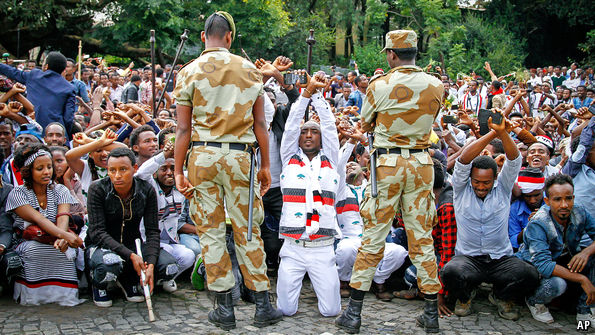Just three days earlier, a stampede at a religious festival in Bishoftu, a town south of the capital, had resulted in at least 52 deaths. Mass protests followed. Opposition leaders blamed the fatalities on federal security forces that arrived to police anti-government demonstrations accompanying the event. Some called the incident a “massacre”, claiming far higher numbers of dead than officials admitted. Unrest billowed across the country.
From The Economist. The political unrest in Ethiopia strikes me as one of the more under-reported events of the year. It’s the 13th largest country in the world by population, the second largest economy in sub-Saharan Africa if you ignore oil and gas, a key US ally in regional conflicts (Somalia but perhaps also Yemen), a growing source of imported manufactures to Europe, a popular destination for Asian investment dollars, and a major country in the World Bank’s lending portfolio.
As autocratic regimes go, it is more stable than some. When Prime Minister Meles Zenawi died in 2012, the world barely noticed, because the political system had a a process and qualified party man to replace him. How many countries could do the same, especially in sub-Saharan Africa?
This goes to show the extent to which power in Ethiopia is institutionalized in a ruling party, not a strongman, and how important that institutionalization is for a country to have stable growth (autocratic or not). When talking about autocracies, journalists and academics often overlook this quality.
That said, Ethiopia also has some hallmarks of instability, especially the fact that the ruling party is dominated by a small ethnic minority, ex-rebel leaders from the northern Tigray region. As risk factors go, ethnic minority rule is one of the strongest predictors of some kind of state failure.
At the same time, my hunch is that being a nascent industrial producer will reduce the chances of conflict. In Kenya, for instance, the 2007 election violence led to a huge push from capitalists (domestic and foreign) to tamp down future instability. Industrial production is often so productive that even a small sector accounts for a huge amount of national wealth. And that production is way more sensitive to political instability than most resource and commodity production.
This should give Ethiopia’s government an added incentive to find a peaceful solution, especially to the extent that the party and elites are invested in the industrial sector or the local property market. The Economist article hints at the role industry is playing:
The government is rattled by the prospect of capital flight. An American-owned flower farm recently pulled out, and it fears others may follow. After almost a week of silence, the state-of-emergency law was a belated attempt to reassure foreign investors, who have hitherto been impressed by the economy’s rapid growth, that the government has security under control.
I have been running a study of industrial workers in Ethiopia for several years, but I’m fairly ignorant about party politics and the roots of the conflict. If I were reporting on this, here’s what I would want to investigate: How removed and insulated are the party elites from the economic consequences of war? How much do the opposition leaders (and armed leaders) think about these economic pain points, and are they thinking strategically about using them? How chunky is political power, and can the ruling party credibly share a little more power, to broaden the ethnic coalition just enough to stave off war?
There must be Ethiopia experts who can correct any misconceptions I have.


8 Responses
That said, Ethiopia also has some hallmarks of instability, especially the fact that the ruling party is dominated by a small ethnic minority, ex-rebel leaders from the northern Tigray region
golu dolls
golu dolls
This should give Ethiopia’s government an added incentive to find a peaceful solution, especially to the extent that the party and elites are invested in the industrial sector or the local property market
And the opposition is clueless about economic stakes and strategies. As to the possibility of a “fairer” coalition, non-existent.
It is such a great article. The media barely reported the case.
The Economy is not dominated by military establishments as Peter commented. He is right that the military in Egypt contributes (maybe better to say “own”) more than 40% of the economy. In Ethiopia the economy is controlled by military generals (personal business) and those attached to them and politicians. They all are from one ethnic minority. This is all the root cause of what is currently happening in the country.
There are many gorilla fights every day in the country side. The armed forces are getting unified while the ruling party starts to break. It is not too far to witness the shades of ethnic Federalism, which may ended up with creating a big stateless nation. This is the country where Obama officially acknowledged the 100% control of the parliament seat by the ruling party.
“Couple of Americans know that right now a huge number of individuals… A long ways past the features, two of the world’s most savage clashes.
Visit at : http://brilliantwritings.com/
Perhaps professor Nega could comment.
FYI – an interesting article on this subject in Foreign Affairs
https://www.foreignaffairs.com/articles/ethiopia/2016-08-29/behind-violence-ethiopia
From what I hear, a quite large share of Ethiopia’s economy is linked to its military establishment. I wonder how/if this affects your theory that nascent industrial producers are less prone to conflict. A point in case would be Egypt, which also has strong military interests in the economy. While it is not desirable for such a regime to have foreign investment pull out, it might be the lesser evil compared to more inclusive politics, if they threaten elite control over important economic sectors.